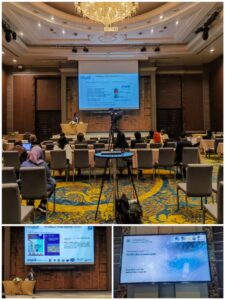Prepared by: Raphael Roman, Lin Wang, Yuntao Wang, Yushi Morioka, and Abe Woo
One week after the UN Ocean Decade Conference convened the global Ocean Decade community In Barcelona from 10-12 April, 2024, the Government of Thailand hosted the 2nd UN Ocean Decade Regional Conference in conjunction with the 11th WESTPAC International Marine Science Conference in Bangkok from 22-25 April, 2024. Co-organized with the UNESCO/IOC Sub-Commission for the Western Pacific (WESTPAC), the regional conference gathered 1,200 participants from over 40 countries, including the largest in-person representation of ECOP Asia members since the launch of the UN Ocean Decade in 2021.
During the first implementation year of the UN Ocean Decade, WESTPAC organized the UN Ocean Decade virtual kickoff conference for the Western Pacific and its Adjacent Areas from November 25-26, 2021. At the time, ECOP Asia members led an incubator session to “share existing knowledge and past experience of science communication efforts organized in Asia […], and to discuss effective ways and technical tools to engage more non-professionals and stakeholders in the UN Decade and WESTPAC communities.” The ECOP-led session attracted close to 50 participants across a variety of sectors and career stages. More information is available in the summary report published on the ECOP Programme website here.
At the 2024 WESTPAC conference, ECOP Asia members made their voices heard through the issuance of the WESTPAC ECOP/MCOP Statement – a joint endeavor by Early- and Mid-Career Ocean Professionals – and brought their energy, passion, commitment, and expertise to the various Scientific Sessions, Plenaries, Workshops, and Incubators that took place in Bangkok. Importantly, two Workshops and one Incubator session were co-convened, moderated, and brilliantly executed by ECOP Asia team members, addressing key Ocean Decade topics such as Ocean Literacy, Multidisciplinary Practices, and Citizen Science. Learn more about the insights and recommendations that emerged from each event below:
Workshop 9: Ocean Literacy with all: Dialogue with ECOPs
Led by the Ocean Literacy Hub of the ECOP Asia node, this session gathered ocean literacy experts and young professionals from across Asia together. Specifically, the workshop aimed at brainstorming what materials and resources are needed for the region, sharing best practices and experiences, highlighting gaps and what can be achieved together as a community, promoting collaborations, and reflecting on how WESTPAC, UNESCO, and other Ocean Decade stakeholders can contribute to the mainstreaming of ocean literacy in Asia.
The two-hour session was attended by around 50 participants and featured five invited speakers from China, India, Malaysia, and from the UNESCO/IOC Project Office of the Regional Bureau for Science and Culture located in Venice, Italy. Additionally, the workshop showcased a video compilation of four innovative ocean literacy projects from Myanmar, India, Malaysia, and the Philippines, submitted as part of the ECOP Programme’s global ocean literacy video series. The last 20-minutes were dedicated to an engaging panel session with the audience.
From the panel conversations emerged some key outputs and recommendations, including:
- Establishing a long-term regional platform for Ocean Literacy in Asia, in order to (i) help share stories, experiences, and best practices; (ii) develop transboundary collaborations; (iii) connect people; (iv) incubate new projects and initiatives; (v) engage a wide array of stakeholders from the regional ocean space, such as government officials, media and press, private corporations, shipping companies, and civil society.
- Integrating cultural perspectives from citizens and local knowledge holders into the Ocean Literacy narrative.
- Ensuring that decisions and actions coming from governments and policy-makers are aligned with Ocean Literacy principles and priorities.
- Facilitating, nurturing, and promoting two-way communication between academia and local communities – landlocked and coastal ones.
- Supporting the formulation and establishment of the Venice Declaration, which was unveiled during the Ocean Literacy World Conference in Venice from 7-8 June, 2024.
- Bringing the first UNESCO/IOC Ocean Literacy Dialogue to Asia in 2025, which has hitherto been taking place in Europe, Africa, and North and South America.
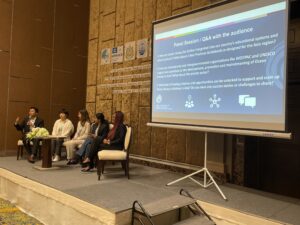
Workshop 10: UN Decade Actions and Multidisciplinary Practices Addressing ECOP Challenges
The Multidisciplinary Practices from ECOP Asia workshop convened over 30 attendees. Five Presenters from the ECOP and MCOP (Mid-Career Ocean Professionals) communities gave insightful presentations on various topics, including fruitful collaboration with industry and marine education/outreach in schools. Throughout the session, speakers shared their experiences in developing national ECOP networks/nodes in China and the Republic of Korea, discussed the potential of ECOPs in contributing to the Ocean AI industry, highlighting opportunities for innovation and collaboration, shared useful tips in high-level paper publication, collaborative research in marine fisheries, and collaborative efforts in climate change research.
ECOPs actively engaged in the session, posing diverse questions regarding the future implications of AI technology on ECOP employment prospects and much more. During the group discussion segment, speakers offered valuable advice on identifying career development opportunities and securing funding, further enriching the dialogue.
The Multidisciplinary Practices from ECOP Asia workshop offered ECOPs and MCOPs invaluable insights and useful tips for professional growth. Attendees were encouraged to actively participate in the ECOP network, leveraging the shared experiences and expertise of fellow professionals for mutual benefit and advancement. Some key recommendations that originated from the workshop include:
- Seek for the valuable contribution to the community: In addition to requesting opportunities such as research funds, stable positions, training, and mentoring, it is essential to present the added value of ECOP scientific research to further support ECOP activities under WESTPAC and the framework of the UN Ocean Decade.
- Integrate and Interact with experienced professionals: ECOPs can gain valuable experience and knowledge from middle and senior career ocean professionals (e.g., through attending conferences), contributing to the development of their research capacity while addressing some of the obstacles and challenges they face.
- Foster the future generation for participating ocean activities: To nurture the next generation of ECOPs and sustain their research activities, it is crucial to communicate the “fun” aspect of marine research to younger students and guide their curiosity-driven exploration in marine science.
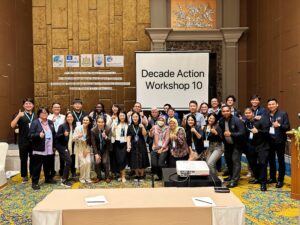
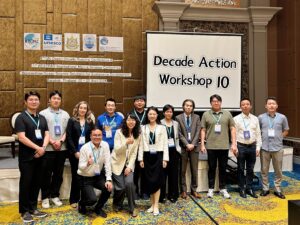
Incubator 1: ECOPs’ efforts on citizen science
The Decade Action Incubators served as interactive forums to catalyze partnerships, strengthen dialogue from ocean knowledge generators to knowledge users, initiate co-design processes, and facilitate the development of potential Ocean Decade Programmes or Projects.
Of the eleven Incubator sessions held during the conference, Incubator #1 focused on ECOPs’ efforts in citizen science. The Incubator was attended by around 30 people, mostly ECOPs coming from Thailand, Malaysia, Singapore, Philippines, and Japan. There were 4 presentations to discuss and reflect about what worked and, most importantly, what did not work while conducting citizen science projects.
The productive incubator resulted in the following outputs and recommendations:
- Expand the membership of the WESTPAC Working Group on Citizen Science to include partners from different countries (e.g., Philippines, SIngapore and Thailand);
- Provide training opportunities for ECOPs on citizen science;
- Organize a future workshop to produce and translate modules/booklets in local languages;
- Develop and submit a proposal for a Decade Action – most likely an endorsed Project – for “WESTPAC ECOPs on Citizen Science”.
